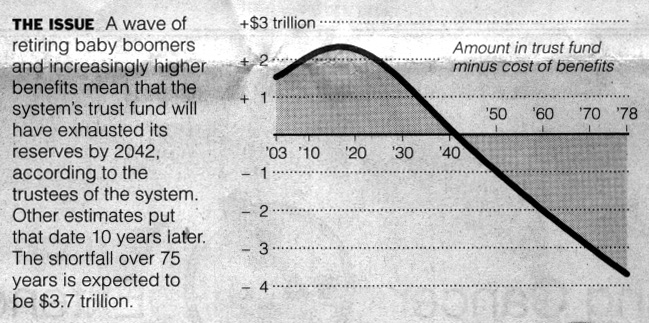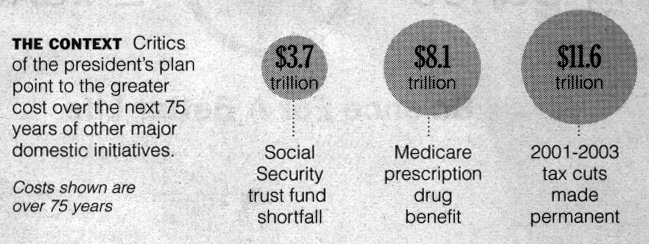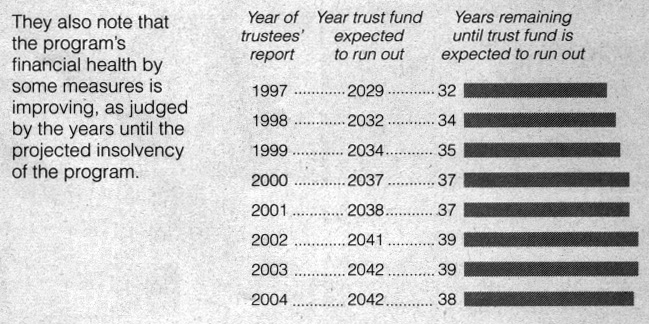The president who brought you Iraq's Weapons of Mass Destruction now brings you Social Security's Imminent Bankruptcy. Social Security privatization will result in less cost efficient management and a siphoning of retirement resources by for-profit financial industries.
"One way or another, societies with more old people have to devote more resources to them," says Roger Lowenstein, in a January 16, 2005 article in The New York Times magazine entitled "A Question Of Numbers."
An economist at the University of Chicago named Austan Goolsbee estimated the windfall profit that Wall Street firms would make if Social Security were partially privatized between now and, say, the next several decades. It comes to almost a trillion dollars. A trillion dollars in fees and other charges would accrue to Wall Street in profits. That is by far the greatest windfall in human financial history. It's really hard to overestimate how much this would potentially be worth to the financial community if they could ever get it through – just an enormous amount of money. By the way, it's money that would be directed to them in a mandatory fashion, you know. This would not be a matter of choice. Everybody would still be in this system, and the money would just be flowing to them – taken out of your paycheck. It's, in a way, beyond their wildest dreams.
Some of them are going to rob you, too, as happened in England. When their Social Security in Britain was privatized twenty years ago, they ended up with tremendous frauds. Now I'm not saying that the people who are promoting Social Security now want to commit a fraud. But certainly they know that there's a grave risk of fraud, typically against less experienced investors and people who might not know better. That doesn't bother them. They're willing to countenance that risk.
American International Group, which is one of the biggest promoters of this and has given a lot of money to the Cato Institute to promote privatization, is under investigation now and the CEO was forced to resign. So, yes, that is a very live issue.
Source: "BuzzFlash interview: Joe Conason" BuzzFlash.com - 09.22.05
Decades of conservative marketing have convinced Americans that government programs always create bloated bureaucracies, while the private sector is always lean and efficient. But when it comes to retirement security, the opposite is true. More than 99 percent of Social Security's revenues go toward benefits, and less than 1 percent for overhead. In Chile's system, management fees are around 20 times as high. And that's a typical number for privatized systems.
These fees cut sharply into the returns individuals can expect on their accounts. In Britain, which has had a privatized system since the days of Margaret Thatcher, alarm over the large fees charged by some investment companies eventually led government regulators to impose a "charge cap." Even so, fees continue to take a large bite out of British retirement savings.
So the Bush administration wants to scrap a retirement system that works, and can be made financially sound for generations to come with modest reforms. Instead, it wants to buy into failure, emulating systems that, when tried elsewhere, have neither saved money nor protected the elderly from poverty.
Source: Buying Into Failure By PAUL KRUGMAN - New York Times December 17, 2004
The administrative costs of keeping track of these private accounts, according to President Bush's Commission to Strengthen Social Security, will be 10 to 30 times the cost of administering the current system, eating up almost all of the hypothetical gains that equity investments could provide.
Source: "Choose and Lose" by Barry Schwartz - New York Times - 1/5/05
Here's the truth: by law, Social Security has a budget independent of the rest of the U.S. government. That budget is currently running a surplus, thanks to an increase in the payroll tax two decades ago. As a result, Social Security has a large and growing trust fund.
When benefit payments start to exceed payroll tax revenues, Social Security will be able to draw on that trust fund. And the trust fund will last for a long time until 2042, says the Social Security Administration; until 2052, says the Congressional Budget Office...
There are only two things that could endanger Social Security's ability to pay benefits before the trust fund runs out. One would be a fiscal crisis that led the U.S. to default on all its debts. The other would be legislation specifically repudiating the general fund's debts to retirees.
There are two serious threats to the federal government's solvency over the next couple of decades. One is the fact that the general fund has already plunged deeply into deficit, largely because of President Bush's unprecedented insistence on cutting taxes in the face of a war. The other is the rising cost of Medicare and Medicaid.
As a budget concern, Social Security isn't remotely in the same league. The long-term cost of the Bush tax cuts is five times the budget office's estimate of Social Security's deficit over the next 75 years. The botched prescription drug bill passed in 2003 does more, all by itself, to increase the long-run budget deficit than the projected rise in Social Security expenses.
Source: "Stopping the Bum's Rush" by Paul Krugman - New York Times - 1/4/05
"If you compare its position now with its position at the time of the last reforms in 1977 and 1983, it's clearly better," [said Peter Diamond, a professor of economics at the Massachusetts Institute of Technology and co-author of the book "Saving Social Security."] "Even then, it was readily fixed without radical reforms, and it's obvious that can be done again."
"You can make a real argument that the government as a whole faces big fiscal challenges well before 2042," said Robert Greenstein, director of the Center on Budget and Policy Priorities. "But Social Security is a very small part of the problem." [see graphic below]
"Their [Republican] strategy is, we're going to scare people, cut benefits, privatize and call it a reform agenda," said Representative Rahm Emanuel, Democrat of Illinois.
The Social Security trust fund has been running annual surpluses for more than two decades. It is expected to keep running operating surpluses until 2018, but it will actually expand for 10 more years because of the interest it receives from Treasury Bonds.
But analysts say it is wrong to imply that the trust fund will not pay benefits, because the government could avoid payment only by defaulting on its Treasury bonds, n effect declaring bankruptcy. The consequences of that would be so catastrophic for the government and world financial markets that few economists consider it plausible.
White House officials privately concede that the centerpiece of Mr. Bush's approach to Social Security -- letting people invest some of their payroll taxes in private accounts -- would do nothing in itself to eliminate the long term gap.
"We simply cannot solve the Social Security problem with Personal Retirement Accounts alone," wrote [David Wehner, a White House Political strategist].. "If the goal is permanent solvency and sustainability -- as we believe it should be -- then Personal Retirement Accounts, for all their virtues, are insufficient to that task."
Source: "As White House Begins Campaign for Overhauling Social Security, Critics Claim Exaggeration" by Edmund L. Andrews - New York Times - 1/10/05
"As a matter of fact...by the time today's workers who are in their mid-20s begin to retire, the system will be bankrupt. So if you're 20 years old, in your mid-20s, and you're beginning to work, I want you to think about a Social Security system that will be flat bust, bankrupt, unless the United States Congress has got the willingness to act now. And that's what we're here to talk about, a system that will be bankrupt." -- George W. Bush, lying in a recent statemet regarding the status of Social Security. This valuable information (I.e. fear mongering) brought to you by the same people who brought you Iraqi WMDs, a Hussein/Al Qaeda link, yellowcake from Niger, aluminum tubes for Iraqi nuclear wepons, etc.
Source: Bush Quote from "As a matter of fact" by Molly Ivins - Creators Syndicate - 01.13.05 / commentary by SpinShield
Britain’s 20-year experience with privatization is a cautionary tale Americans should know about.
[A] recent report by Britain's Pensions Commission…warns that at least 75 percent of those with private investment accounts [in Britain] will not have enough savings to provide "adequate pensions."
Guaranteed benefits were cut; workers were expected to make up for these benefit cuts by earning high returns on their private accounts.
The selling of privatization [in Britain] also bore a striking resemblance to President Bush's crisis-mongering. Britain had a retirement system that was working quite well, but conservative politicians issued grim warnings about the distant future, insisting that privatization was the only answer.
Many Britons were sold badly designed retirement plans on false pretenses. Companies guilty of "mis-selling" were eventually forced to pay about $20 billion in compensation. Fraud aside, the fees paid to financial managers have been a major problem: "Reductions in yield resulting from providers' charges," the Pensions Commission says, "can absorb 20-30 percent of an individual's pension savings."
Even if the initial legislation tightly regulated investments by private accounts [in the U.S.], it would immediately be followed by intense lobbying to loosen the rules. This lobbying would come both from the usual ideologues and from financial companies eager for fees.
Meanwhile, there is a growing consensus in Britain that privatization must be partly reversed. The confederation of British Industry -- the equivalent of the U.S. Chamber of Commerce -- has called for an increase in guaranteed benefits to retirees, even if taxes have to be raised to pay for that increase. And the chief executive of Britain's National Association of Pension Funds speaks with admiration about a foreign system that "delivers efficiencies of scale that most companies would die for."
The foreign country that, in the view of well-informed Britons, does it right is the United States. The system that delivers efficiencies to die for is Social Security.
Source: "The British Evasion" by Paul Krugman - New York Times - 1/14/05
A worker who retires in 2050 at age 65 after 40 years of earning a "medium" wage -- equivalent to $38,566 in 2005 dollars -- is currently scheduled to receive a monthy benefit (in 2005 dollars) of $1,771
Under the private investment system, the worker may receive a higher or lower benefit, based on the rate of return of his investments and the fees charged to manage the account.
| Annual Fees |
3.0% Return |
4.9% Return |
| 0.0% | $1,771 | $2,109 |
| 0.3% | $1,731 | $2,044 |
| 1.0% | $1,650 | $1,911 |
Source: Dean Baker, Center for Economic Policy Research via New York Times - 2/6/05
Mr. Bush asserted that Social Security was a bad deal for [African-Americans], "African-American males die sooner than other males do, which means the system is inherently unfair to a certain group of people." I other words, blacks don't live long enough to collect their fair share of benefits.
Mr. Bush's argument goes back at least seven years, to a report issued by the Heritage Foundation -- a report so badly misleading that the deputy chief actuary (now the chief actuary) of the Social Security Administration wrote a memo pointing out "major errors in the methodology."
Here's why. First, Mr. Bush's remarks on African-Americans perpetuate a crude misunderstanding about what life expectancy means. It's true that the current life expectancy for black males at birth is only 68.8 years -- but that doesn’t mean that a black man who has worked all his life can expect to die after collecting only a few years' worth of Social Security benefits. Blacks' low life expectancy is largely due to high death rates in childhood and young adulthood. African-American men who make it to age 65 can expect to live, and collect benefits, for an additional 14.6 years -- not that far short of the 16.6-year figure for white men.
Second, the formula determining Social Security benefits is progressive: it provides more benefits, as a percentage of earnings, to low-income workers than to high-income workers. Since African-Americans are paid much less, on average, than whites, this works to their advantage.
Finally, Social Security isn't just a retirement program; it's also a disability insurance program. And blacks are much more likely than whites to receive disability benefits.
Put it al together, and the deal African-Americans get from Social Security turns out, according to various calculations, to be either about the same as that for whites or somewhat better. Hispanics, by the way, clearly do better than either.
So the claim that Social Security is unfair to blacks is just false.
Source: "Little Black Lies" by Paul Krugman - New York Times - 1/28/05
Social Security is the only source of income for about 38 percent of black retirees and 40 percent of Hispanic retirees, according to government data. In contrast, only 18 percent of white retirees receive income exclusively from Social Security.
Source: "G.O.P. Courts Blacks and Hispanics on Social Security" by Edmond L. Andrews - New York Times - 3/20/05
Precisely because of those death rates, African-American families are especially reliant on Social Security's survivors' benefits, and African-Americans need and draw on Social Security's disability benefits at a higher rate than whites. They are also more likely to rely on Social Security payments to stay out of poverty in old age.
Source: "PC at the GOP" - by E.J. Dionne, Jr. - Washington Post Writers Group - 2/8/05
Last year [2004], 69 percent to total Social Security payments were made to retired workers and their dependents. [17 percent] went to disabled workers and their dependents and [14 percent went to] the survivors of workers who died before retirement age.
Mr. Bush has not said what he has in mind for these [other] components of the Social Security safety net. "The plan is only addressed to the retirees, not to the disabled and survivors. In other words, we're focused on the retirement aspect of Social Security" [said Mr. Bush.]
In a report in January [2005], the National Academy of Social Insurance...said that " Social Security is the main source of life insurance for most families with children."
Under what is known of Mr. Bush's plan, the investment accounts of workers who die young are likely to be quite small. Average earners who die at 40 after having worked for 20 years would probably have less than $40,000 in their accounts. This would not last long if their heirs tapped into the accounts.
Source: "How the President's Plan Would Affect Survivors" by David E. Rosenbaum - New York Times - 3/12/05

Source: Social Seurity Administration; Center on Budget and Policy Priorities via New York Times 1/10/05

Source: Social Seurity Administration; Center on Budget and Policy Priorities via New York Times 1/10/05

Source: Social Seurity Administration; Center on Budget and Policy Priorities via New York Times 1/10/05